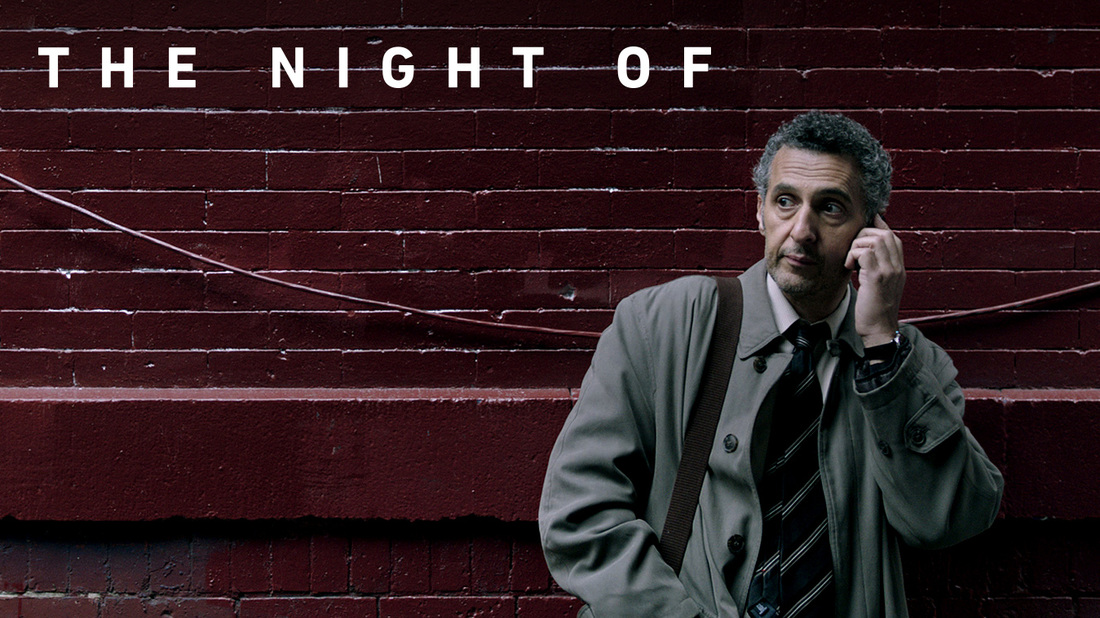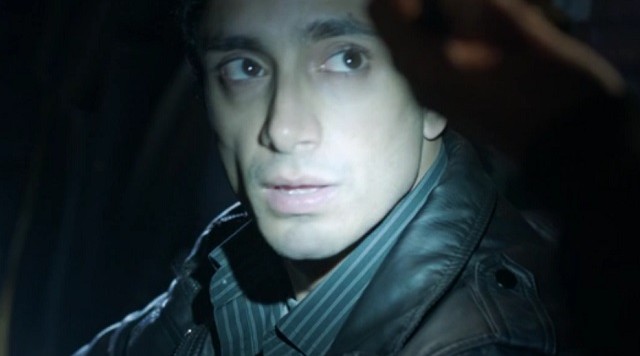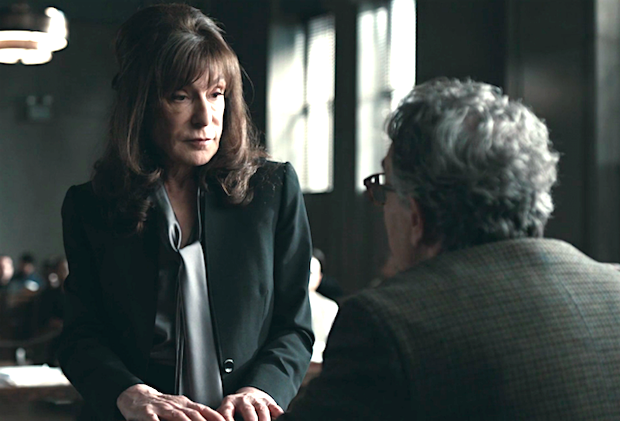 As readers and viewers, we want our stories to end in a satisfying yet surprising way. As writers, perhaps too often we make it easy. Yet the best stories have deep conflicts that seem impossible to recover from. Sharp and worthy adversaries get in the way. If you’re the writer, to make your story and ending compelling requires thought and emotion, delaying the inevitable. You need to be willing to structure, to taunt, to tantalize. A case in point is the recently concluded HBO series The Night Of, starring John Tuturro and Jeannie Berlin. Based on Criminal Justice, a 2008–09 British television series, The Night Of was co-written and directed by Steven Zaillian, known for his scripts to such films as The Girl with the Dragon Tattoo, Schindler’s List, and Searching for Bobby Fisher. Novelist Richard Price, who also wrote a lot of HBO’s The Wire, joined in the writing.  Because this is a case study, I’ll be giving surprises away. Having published two crime novels, Blood Drama and A Death in Vegas, I admire much in this series and understand what the writers needed to do to pull off this mystery. You don’t have to see the series to follow my points. Rather, see how Zaillian and Price deliver so much. You, too, can offer a lot in your own work. The story revolves around Nasir Khan (Riz Ahmed), a Pakistani-American college student who, when his friends don’t pick him up for a party, borrows his father’s taxicab without permission. At a stop, a young woman, Andrea (Sofia Black D’Elia) pops in his cab, asks to go to a beach, and when they stop, they talk, drink beer, and take drugs. It all leads to a night of sex and more drugs at her classy upper Westside brownstone. When he awakes in the kitchen, he finds her stabbed to death in her bed, and he flees, observed. He’s soon arrested. Things stack against him. In fleeing, he cuts himself and leaves blood. He takes the murder weapon, perhaps thinking he did it. He’s Muslim. His parents are immigrants. They have little money for his defense. Only a few small things stand in Nasir’s favor. He’s likable and seemingly innocent. Also, low-end lawyer John Stone (John Tuturro), visiting a low-end client in jail, sees a vulnerable innocent-looking kid in lockup and decides to defend him. The Dramatic Question Let’s pause here. A critical element in storytelling is to set up the dramatic question. Will Nasir, despite prejudice, the skewed judicial system, and the preponderance of evidence against him, be found innocent and let go? Novice writers often muddy or even avoid the dramatic question. Audiences need to know what to root for on the journey. If an audience isn’t clear who the protagonist is or what he or she needs or wants, the story dies quickly. I’m reading a script now where, after twenty-one pages in, the story skips ahead twelve years and follows someone else. Now I don’t know who the protagonist is or what either the first big character or the second one wants. In The Night Of, the viewer, you, believes in Nasir’s innocence. It’s what you hope for every minute unconsciously. You’re waiting to feel good when he’s found innocent. You’d be happy if that happened at the end of the first hour—but would you? We like surprises and doubts. We like to be taken on a journey, even if it’s dark. Theme Another key element has to do with what is the story about? Why are we spending eight hours on this story or, say, more than seventy hours on Game of Thrones? We never consciously look for a message—and we certainly don’t want to be preached at—but we do seek deeper meanings in our stories. It’s why Christopher Nolan’s films such as his Dark Knight Trilogy, Inception, and Momento stick with us—because they tell us things about our world. Here, Zaillian and Price make the viewer question American society and its fairness. We see that justice isn’t just. Rather, police are overworked and look for easy solutions to close cases. The coroner asks the D.A. how should he make the evidence go her way? Innocent people take plea deals to spend only half their life in prison instead of more . Story guru Robert McKee uses the term “controlling idea.” He says that master storytellers “never explain… They dramatize.” A controlling idea should be expressible in a single sentence, a universal truth. As he writes, “The more beautifully you shape your work around one clear idea, the more meanings audiences will discover in your film.” I never write toward a theme, but at least starting in my second draft, I look for where theme pokes its head out, and I follow its truths. I edit my stories to revolve around its theme, its controlling idea. In the end, your story has to be about something, and The Night Of certainly is. How you get there is most clear in the ending. The Important Ending Over the course of the next seven episodes, The Night Of brings many turns and surprises. As in any good story, your hopes build and get dashed. That’s the job of the storyteller. Nasir awaits trial in Riker’s Island, a dark, brutal penitentiary where his life is threatened. Most of the prison population hates him for being small and Muslim. However, an inmate leader, Freddy (Michael Kenneth Williams), who the prison guards let run his little fiefdom, protects Nasir, bringing Naz into the prison culture. Soon Naz works out in the gym, shaves his head, and gets tattoos. We come to the end, the trial. At this point, Naz looks like a criminal, even if he remains soft-spoken. Stone is not his lead lawyer, but second chair. Rookie lawyer Chandra Kapoor (Amara Karan) runs the defense. She essentially talks Naz out of taking a plea deal. Everything is on the line.  Kapoor decides to let Naz testify, against Stone’s strenuous objections. Stone says a defendant has the cloak of presumed innocence, but if he testifies, he’s assumed guilty and has to prove his innocence. When district attorney Helen Weiss (Jeannie Berlin) cross-examines Naz, we see Naz still isn’t clear what happened. He has his doubts. Weiss’s questions hammer home what appears to be Naz’s guilt. Before this, the viewer has had hopes. We learn that Andrea’s stepfather, the murdered girl’s antagonist, had designs on her estate, worth ten million. He filed for it days after her murder, and the police did not even investigate him. We learn that three other people who met the young couple that night all had criminal backgrounds and motive. The police didn’t investigate them, either. District attorney Weiss plows through these possibilities, brushes them aside. Naz, she says, clearly murdered Andrea brutally, and when he had a chance to call 911 if he didn’t do it, he did not. Weiss appears focused and brilliant—even if at this point she knows of another more likely murderer. When Kapoor has to step aside from delivering her closing arguments in a twist that has to do with judicial ethics, the judge forces John Stone to deliver the final thoughts to the jury. Stone, who has had health problems with eczema, has a major flare-up, has to go to the hospital, and now appears before the jury much like a leper. Can he overcome the D.A’s brilliant presentation and make the jury see? As much as we want that, we have our doubts. Then smart writing and Turturro’s brilliant acting come together. Stone admits he’s not the best lawyer or even used to speaking to juries, not looking the way he does. Still, he focuses on what’s truth and what’s speculation, what’s fair and not fair, and before our eyes, we can see at least some jurers might have doubts about Naz’s guilt. An old-fashioned Hollywood movie might have the jury come back beaming, eagerly saying Naz has been treated unfairly and he’s clearly innocent. Naz and his family would have a big party, and the girl next door (if there was one) would kiss him and everything would be all right. Rather, here, the jury is deadlocked, six to six. That could mean another trial. Still, the D.A., knowing there’s a more-likely murderer, drops the case. Naz is free. It could end there, and we’d be satisfied, but theme now comes most clear. While Naz is free, he’s not the same person. He’s addicted to crack. He’s covered in tattoos. His own mother had felt he was he’s guilty, and Naz knows it. He’s a broken person. Justice isn’t fair. Still, the series makes one more point. Shortly after the murder, Stone sees the murdered girl’s cat now has no one to feed it. He takes the cat home, but he’s deeply allergic to it. Will the cat at least be saved? No, Stone takes it to a shelter. It will have only ten days to be given away or euthanized. Here, Zaillian stumbled on something important. As he said in an interview, “When [Stone], and we, first see the shelter, its stark walls and cages resemble a prison cellblock. This, too, was intentional. And as the cat with no name is carried by a volunteer past the chain-link cages housing loud dogs, it’s an experience not unlike Naz’s when he’s first taken into Rikers by a corrections officer. The outlook for both of them is grim. From there it was a matter of asking, ‘now what,’ ‘what if,’ and ‘then what,’ and ‘then what if.’ This is what writing is.” One of the last images is the cat prancing back at Stone’s apartment. Stone has saved it once again. While justice isn’t always fair, there are the small victories.
27 Comments
 To those who follow me: sorry I’ve been away for almost two months. I’ve been literally coughing since that time, and in mid-June, my doctor took a chest X-ray and decided I had pneumonia. The antibiotics didn’t work. I then saw a pulmonologist—a lung specialist. A few CT scans and a biopsy later, my pulmonologist discovered I had a rare condition called vasculitis, an autoimmune issue. During this time, knowing I had a breathing problem—could it be lung cancer?—I read an emotionally powerful book, When Breath Becomes Air by Paul Kalanithi. It’s nonfiction, Kalanithi’s journey through lung cancer. Spoiler alert: he dies. Perhaps I shouldn’t have started the book when I did, but then again, when you’re thinking dark thoughts, you can’t help but consider them. Kalanithi writes so honestly and even lyrically at times, he takes your breath away. For instance, once he’s sat with his initial chest X-ray that proves to him how dire his situation is, he writes, “The tricky part of illness is that, as you go through it, your values are constantly changing. You try to figure out what matters to you, and then you keep figuring it out. It felt like someone had taken away my credit card, and I was having to learn how to budget.” Should he continue on as a neurosurgeon, saving lives, or should he take time off and do other significant things? Before he started chemo, he and his wife focused on whether they could or should start a family. “Will having a newborn distract from the time we have together?" his wife Lucy asks. "Don't you think saying goodbye to your child will make your death more painful?" "Wouldn't it be great if it did?” he says, and adds, “Lucy and I both felt that life wasn't about avoiding suffering.” They go to a fertility specialist, and she is able to get pregnant. They both cheer about it. When he goes through chemo and wonders if it will kill him, he thinks, “I can’t go on. I’ll go on.” I could empathize. When my first doctor said I had pneumonia, as drained and winded as I was, I felt great. At last I had a reason for why I felt so bad. Friends then told me of when they had pneumonia, warning me it was difficult, and still it was better than not having a diagnosis. I finished my antibiotics on the Fourth of July and couldn’t make it to the nearby fireworks as I was coughing too much, too drained to go. I had a sinking feeling I didn’t have pneumonia. Was I headed where Kalanithi went? It took another six weeks for me to get to vasculitis. As someone who had been healthy for decades—a cold being the worst—I found myself thinking differently when I was confined to bed. It opened my eyes, reminding me that people out there, including readers of this blog, have daily physical challenges. Emotional ones, too. At my darkest, I’d consider that maybe things would keep going downhill until it’d be all over. Along the way, two of my lymph nodes became rock hard. I must have lymphoma, I decided. Or maybe I had what the neighbor across the way from us had. He’d gone to the dentist for teeth cleaning, then days later felt lousy. His doctor found the man had sepsis. That affected a heart valve. He needed heart surgery and a bovine heart valve quickly. I realized I’d had my teeth cleaned in early June. You see what happens? When you don’t know what you have, you think of the worst and realize people get bad things. Who says you can’t? The end for most people comes sooner than expected. Philosopher Martin Heidegger felt we should all contemplate our deaths, and once we truly feel it, we can live each day feeling alive and “present in the moment.” Once I did, however, I didn't feel present. I simply felt sad. Look at the things I'll miss. My wife and children. My students. My tomato plants. On the positive side, my energy is back, and I’m writing again. I polished my latest novel, and now I’m deciding on the next book. It’s good to again be the optimist. I also realize, hey, this life isn’t forever. Take advantage of the good days. |
AuthorBefore I wrote novels and plays, I was a journalist and reviewer (plays and books). I blogged on Red Room for five years before moving here. CategoriesArchives
July 2023
|
 RSS Feed
RSS Feed
